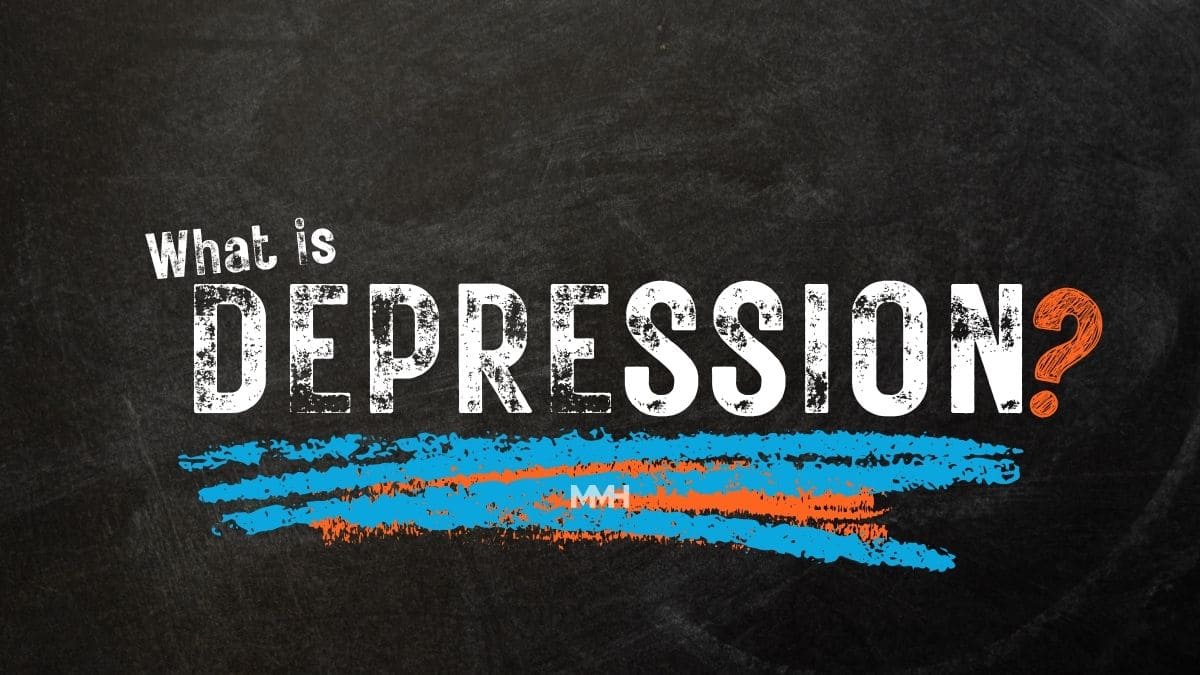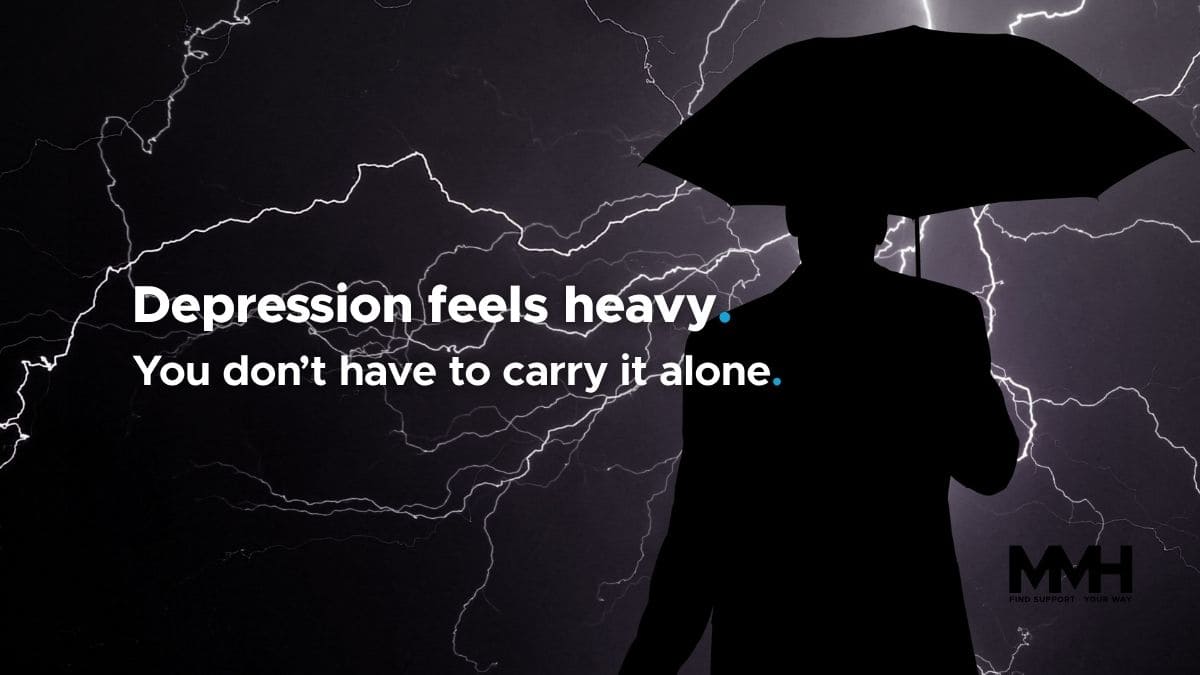MMH Men’s Mental Health does not provide direct mental health support. We do not offer crisis intervention, therapy, counselling, or medical advice. Instead, we provide information and signposting to external services that may be able to help.
Depression
Need to talk? Free, confidential support is available.
Need to talk?
Samaritans are here to listen, 24/7, 365 days a year. You can call them for free on 116 123 or visit www.samaritans.org
Prefer to Text?
Shout is a free, confidential, 24/7 text messaging support service for anyone who is struggling to cope.
If you feel in danger please call 999 or go directly to emergency services.
Man Up? No Way. Understanding Depression in Men
Society tells men to be tough, bottle things up, and power through. But what if that strength hides a deeper struggle, and silence only amplifies the darkness? Depression isn’t a sign of weakness—it’s a serious mental health condition that affects millions of men, often going undiagnosed and untreated.
🚨 It’s okay to not be okay, and seeking help is a sign of strength, not weakness. 🚨
This page sheds light on depression in men, offering clear explanations and resources to help you navigate this challenge.

What is Depression?
Depression is more than just feeling down—it’s a medical condition that affects your mood, energy, and daily life. It can impact your thoughts, emotions, and behavior, leading to changes in sleep, appetite, and even physical health.
📌 Key fact: Depression in men often looks different. While sadness is common, men are more likely to show signs like anger, irritability, emotional numbness, or reckless behavior. These symptoms often go unnoticed or misinterpreted.
✅ Recognizing depression can help you:
- Understand why you’re feeling this way.
- Identify when it’s time to seek support.
- Take steps toward managing your mental well-being.

What Causes Depression in Men?
Depression doesn’t have a single cause, but several factors can contribute:
🔹 Brain Chemistry – Imbalances in neurotransmitters like serotonin and norepinephrine can affect mood.
🔹 Genetics – If depression runs in your family, you may be at higher risk.
🔹 Life Stressors – Job loss, work stress, financial struggles, relationship problems, and past trauma can trigger depression.
🔹 Social Pressures – Men are often told to “man up” and suppress emotions, making it harder to seek help.
🔹 Substance Abuse – Alcohol and drugs are sometimes used to cope, but they ultimately make depression worse.
📌 Ignoring depression can lead to more severe symptoms, strained relationships, and increased health risks.

What Are the Symptoms of Depression in Men?
Depression can affect thoughts, emotions, and behavior, but men may experience symptoms differently. Look out for:
🟠 Emotional Symptoms
- Anger & Irritability – Feeling constantly on edge, snapping at others.
- Emotional Numbness – Feeling empty or disconnected from life.
- Loss of Interest – No longer enjoying hobbies, work, or even sex.
🟠 Physical Symptoms
- Fatigue & Low Energy – Feeling drained, even after sleep.
- Changes in Appetite & Weight – Eating too much or too little.
- Sleep Problems – Insomnia, oversleeping, or restless nights.
🟠 Behavioral Symptoms
- Trouble Concentrating – Struggling to focus at work or on daily tasks.
- Social Withdrawal – Avoiding family, friends, and social events.
- Reckless Behavior – Risk-taking, excessive drinking, or substance use.
- Feeling Hopeless – Persistent negativity, loss of motivation, or struggling to see a way forward.
📌 If you or someone you know is experiencing these symptoms, seeking help is essential. Depression is treatable, and support is available.

The Different Types of Depression
There are several types of depression, each with its own characteristics:
🔹 Major Depressive Disorder (MDD) – Persistent, severe symptoms lasting at least two weeks, interfering with daily life.
🔹 Persistent Depressive Disorder (Dysthymia) – Milder symptoms but long-lasting (two years or more).
🔹 Seasonal Affective Disorder (SAD) – Depression that occurs seasonally, often during winter due to lack of sunlight.
🔹 Atypical Depression – Includes oversleeping, increased appetite, and heavy limbs, alongside sadness and hopelessness.
📌 Depression is different for everyone. The important thing is recognizing when you need support and taking steps to get help.
🚨 You are not alone. With the right treatment, lifestyle changes, and support, depression can be managed.
Explore More
Depression
- Mind - Depression provides information and support for dealing with depression.
- Depression Alliance offers support and resources for those affected by depression.
- SANEline offers emotional support and information for people affected by depression.
- NHS - Depression provides comprehensive information about depression and its treatment.
- Time to Change aims to change the way people think and act about mental health issues, including depression.
While we aim to provide accurate and updated information, MMH Men’s Mental Health is not responsible for the quality, accuracy, or availability of external services linked on this page. If you notice a broken link or have a resource to suggest, let us know.
Practical Ways to Strengthen Your Mindset
You don’t have to do everything at once. Start with one step and build from there.
If your struggles persist or affect your daily life, consulting a professional is recommended.
Talk to your doctor
They can assess your symptoms and recommend the best course of action, whether it’s medication, therapy, or a combination of both.
Find a therapist
Talking to a professional can help you understand your depression and develop coping mechanisms. They can also be a safe space to vent and express those emotions you might be bottling up.
Don't go it alone
Talk to a friend, family member, or join a support group. Connecting with others who understand what you’re going through can be a huge help. If you prefer to speak to someone annonymously The Samiratans are available 24/7.
Take care of yourself
Exercise, eat healthy foods, and get enough sleep. These lifestyle changes might seem small, but they can have a big impact on your mood.
Find healthy ways to cope
Maybe it’s meditation, yoga, spending time in nature, or picking up an old hobby. Find something that helps you relax and manage stress.
You Are Not Alone.
One step at a time - you’ll get through this.
Take the next step:
Need to talk?
Samaritans are here to listen, 24/7. You can call them for free on 116 123 or visit www.samaritans.org
Prefer texting?
Shout offers free, 24/7 confidential support. Text ‘SHOUT’ to 85258 to start a conversation or visit
www.giveusashout.org
Explore More
Looking for guidance? Browse external resources on mental health, self-care, and well-being.
Support Groups
Find connection. Join an external support group and connect with others who understand.
